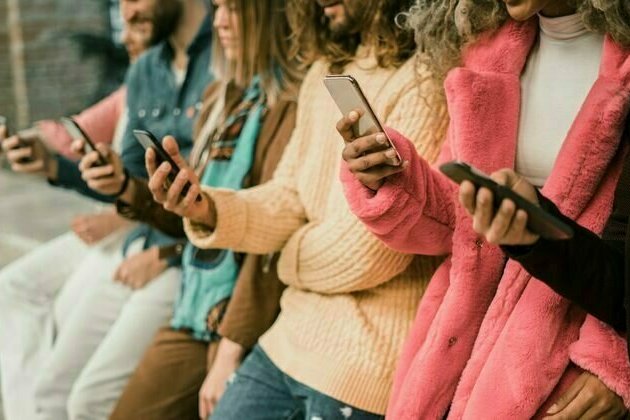Amplifying delusions: How social media can negatively impact our mental well-being
The Conversation
16 Apr 2025, 15:38 GMT+10

Imagine a tribe of uncontacted hunter-gatherers in the deepest Amazon rainforest. Anthropologists airdrop dozens of smartphones loaded with social media apps, with solar chargers, simple instructions in their native language and Wi-Fi just within the tribe. What would happen to their culture and their mental health?
Such an experiment appears fanciful, but a similar one has been unfolding in our world for about 20 years. For the first time in human evolution, everyday social interactions have changed from face-to-face to disembodied experiences, from in-person to digital and from social reality to whatever someone puts online.
Social media is an evolutionary novelty, like M&M's, e-cigarettes, fentanyl and H-bombs. Each comes with novel risks to health and well-being to which humans are entirely unaccustomed.
What, then, are the risks of seemingly innocuous behaviours such as sharing posts, giving likes, making oneself look good in pictures, and, in general, interacting virtually rather than physically? The short answer is that we don't know - yet - especially because our big experiment has no control group.
But we can try to find out.
We recently investigated the question of what mental disorders are associated with high social media use. To do so, we conducted a systematic review - an objective way to find and evaluate all of the relevant literature. We hypothesized that social media use should be higher among people whose psychology, and psychiatric traits and disorders, were more socially mentalistic.
Mentalism refers to within-brain traits like theory of mind, inferring intentions or emotions of others and empathizing. Social media is expected to be mentalistic because it involves disembodied thoughts, feelings and associated images, intended to connect us with other humans. Mentalistic thinking contrasts with the mechanistic cognition of scientists plying their trade of cause and effect in the physical, non-mentalistic world of things.
To test our hypothesis, we scrutinized hundreds of scientific articles, and a curious picture emerged. High social media use was strongly associated with a subset of mentalistic traits and disorders: narcissism, erotomania (the belief that some celebrity loves you), paranoia, body dysmorphia and anorexia.
These traits and disorders seem unrelated, but we noticed they all centrally involve delusions: false beliefs about reality, held despite absent or contradictory evidence. Some delusions can be mental (narcissism, paranoia, and erotomania), or physical (body dysmorphia and anorexia). Some are positively valanced (narcissism and erotomania) and some are negative (paranoia, body dysmorphia and anorexia).
Why, then, was social media associated with delusionality?
Like other mental traits, delusions exist in one's brain for a reason. What these mental disorders also appear to share, psychologically, is an underdeveloped and fragile sense and construction of the self, which happens during early life through social interactions with family, friends, and others.
If one's mental and perceived bodily self is underdeveloped in childhood, it can, later, be bolstered, and this commonly happens through social interactions that involve beliefs that, though false, make oneself feel better.
Low self-image and self-esteem can be shored up through admiration or love from outside - with extremes of narcissism or erotomania. Perceived embodiment and body image problems can be enhanced through fictitious beliefs about appearance - with extremes of body dysmorphia and anorexia.
What better way to do any of these things than with social media and the internet, where users can pursue likes and followers to their heart's content, and present themselves mentally and physically as they wish, using applications designed specifically for that purpose?
Most importantly, social media allows users to delusionally "improve" themselves because it circumvents reality testing: the direct, face-to-face interactions we engage in when physically interacting with other people.
As we outline in our paper, the processes just described represent a "Delusion Amplification by Social Media" model that can help explain why and how high social media use is linked with a specific subset of mental disorders that involve delusions and an underdeveloped self.
By this model, some people are relatively vulnerable, psychologically, to the negative effects of social media, because they are drawn to it, and because it amplifies and exacerbates their problems. This exacerbation is, of course, not benign or accidental; the goal of many social media companies is, after all, to keep us online, scrolling, striving and seeking hits of social pleasure and self-validation.
What, then, then can be done, aside from cutting the virtual social umbilical cord? First and most crucial is enhanced awareness of our own psychological makeups and how they are affected by specific platforms or apps. The problem with delusions, of course, is lack of awareness that our reality is false - but we can still become more cognizant of the rifts between perceived and actual worlds and what drives them.
Second is more research, to extend the delusion amplification model, and to better determine the psychological and neurological differences between in-person and virtual interactions, and what mental problems they can cause.
If we find that social media really is ruining mental health, as suggested by recent increases in narcissism, body dysmorphia and other disorders among young people, then the research will need to be incorporated into policy, so we can regain control over our social lives, our brains and our social worlds.
 Share
Share
 Tweet
Tweet
 Share
Share
 Flip
Flip
 Email
Email
Watch latest videos
Subscribe and Follow
Get a daily dose of International Technology news through our daily email, its complimentary and keeps you fully up to date with world and business news as well.
News RELEASES
Publish news of your business, community or sports group, personnel appointments, major event and more by submitting a news release to International Technology.
More InformationComputers
SectionAmbassadors' Meet organised by MDoNER garners huge support from foreign diplomats
New Delhi [India], April 16 (ANI): In a significant step toward enhancing international cooperation and fostering global investment...
Aircraft with 12 Indians on board makes emergency landing in Nepal
Kathmandu [Nepal], April 16 (ANI): An aircraft of Sita Airlines, a private airline company operating in remote areas of Nepal with...
EU issuing US-bound staff with burner phones FT
The new guidance reportedly aims to help officials protect their personal and professional data amid spying fears The EU has advised...
New study finds no evidence technology causes 'digital dementia' in older people
In the 21st century, digital technology has changed many aspects of our lives. Generative artificial intelligence (AI) is the latest...
Trials underway in Sonipat for second Asian Yogasana Sport Championship
Sonipat (Haryana) [India], April 14 (ANI): The Sports University of Haryana in Sonipat is hosting the national trials for the upcoming...
No one is "getting off the hook", Trump after US appeared to dial down on China
Washington DC [US], April 14 (ANI): US President Donald Trump has said that no one is 'getting off the hook' on trade after his administration...
Internet
SectionFrench enterprises show confidence in Chinese market at consumer products expo
The opening ceremony of the French National Pavilion is held at the 5th China International Consumer Products Expo (CICPE) in Haikou,...
Donald Trump calls Harvard a "joke," labels university's hiring process "Radical Left"
Washington DC [US], April 16 (ANI): US President Donald Trump on Wednesday criticised Harvard University, denouncing its hiring practices...
Mayank Yadav joins Lucknow Super Giants camp ahead of IPL 2025 clash against Rajasthan Royals
New Delhi [India], April 16 (ANI): Ahead of the Indian Premier League (IPL) 2025 clash against the Rajasthan Royals (RR), Lucknow Super...
Amplifying delusions: How social media can negatively impact our mental well-being
Imagine a tribe of uncontacted hunter-gatherers in the deepest Amazon rainforest. Anthropologists airdrop dozens of smartphones loaded...
China detains Tibetans for mourning Buddhist leader's mysterious death
Beijing [China], April 16 (ANI): Chinese officials have interrogated and detained local Tibetans who shared photographs and posts on...
OpenAI planning to take on Musk's X - media
A prototype from the ChatGPT maker reportedly features an AI image feed and could compete with social media apps ...












